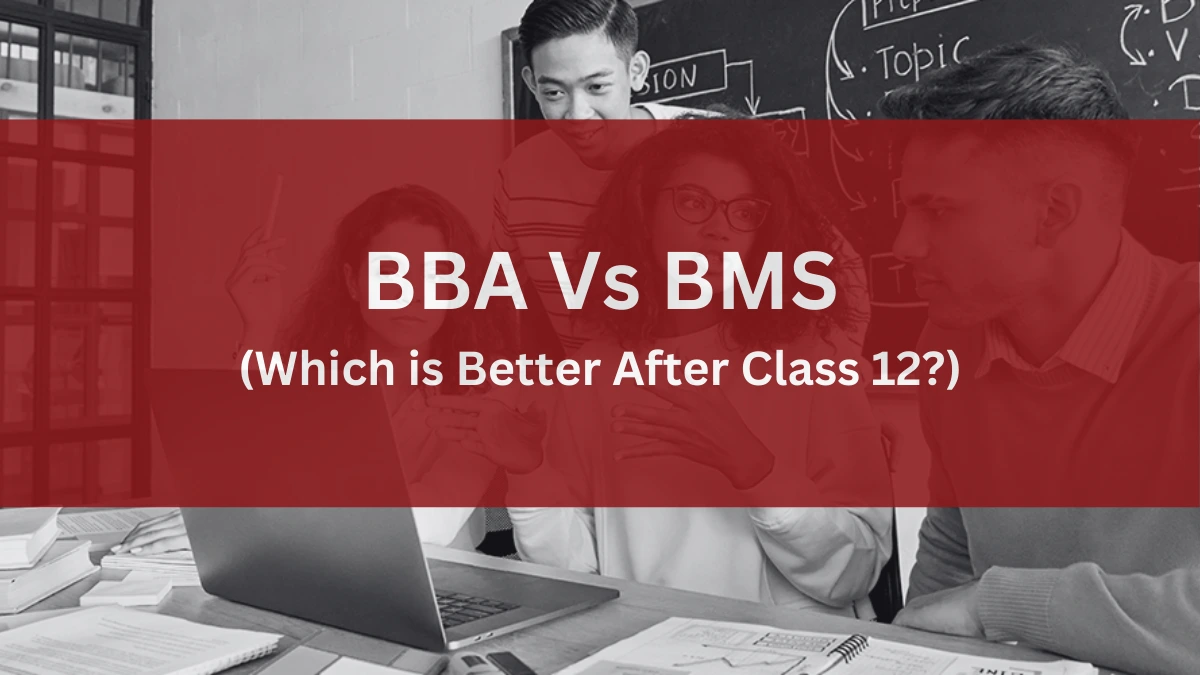BBA Vs BMS: Which is Better After Class 12?
BBA Vs BMS: In the Indian context, BBA (Bachelor of Business Administration) and BMS (Bachelor of Management Studies) are both undergraduate management courses that students pursue, with most culminating in an MBA.

Prima facie, both the courses are preferred by Commerce students and hence look similar, but if you dig a little deeper, you will see that there are a few differences.
BBA:
BBA focuses on business administration, covering topics like finance, accounting, marketing, human resources, and operations management. The pedagogy employed emphasizes practical skills and training for entry-level management positions. BBA is typically a 3-year course, and BBA (Hons) is a 4-year course in universities that abide by the NEP2020.
BBA as a course is offered by many universities and colleges across the country, with a wide range of specializations viz. Marketing, Finance, General Management, Human Resources, Operations and Systems, etc.
BBA Vs BMS: Some of the most reputed universities offering BBA as a course are-
(in no particular order)
- Shaheed Sukhdev College of Business Studies
- NMIMS University
- Symbiosis University
- Christ university
- Mahindra University
- Madras Christian College
Read More: Top 10 BBA Colleges In Mumbai
BMS:
BMS focuses on management studies, covering topics like organizational behavior, business environment, quantitative methods, and management information systems. The pedagogy emphasizes theoretical foundations and conceptual understanding of management principles.
BMS is also usually a 3-year course, with some universities offering a 4-year honors program. BMS is offered by select colleges, mainly in the Mumbai region (e.g., University of Mumbai) and a few in the Delhi region (Delhi University), with a more limited range of specializations.
BBA Vs BMS: Some of the most reputed universities offering BMS as a course are :
(in no particular order)
- HR College
- Jai Hind College
- NM College
- Shaheed Sukhdev College of Business Studies
- Keshav Mahavidyalaya
- Deen Dayal Upadhyaya College
Read More: Krea University: School of Interwoven Arts and Sciences – A Comprehensive Guide
Discovering Liberal Studies at FLAME University: An In-Depth Overview
BBA Vs BMS: Key differences-
– BBA is more practical and skill-oriented, while BMS is more theoretical and conceptually focused.
– BBA offers a broader range of specializations and is more widely available, while BMS is more specialized and region-specific.
BBA:
– Covers a broad range of business topics, including finance, accounting, marketing, human resources, operations management, and entrepreneurship.
– Includes practical training, internships, and project work.
– Offers specializations like finance, marketing, HR, IT, and international business.
For a broad reference on the actual subjects covered in BBA in some of the leading universities in India, the following links can be checked:
- NMIMS BBA Course structure
- Symbiosis BBA Course Structure
- Christ University BBA Course structure
BMS:
– Focuses on management theories, concepts, and principles.
– Covers topics like organizational behavior, business environment, quantitative methods, management information systems, and strategic management.
– Emphasizes case studies, group discussions, and presentations.
For a broad reference on the actual subjects covered in BMS in some of the leading colleges in Mumbai and Delhi, the following links can be checked:
- NM College BMS Course Structure
- Mithibai College BMS Course Structure
- HR College BMS Course Structure
- Shaheed Sukhdev BMS Course Structure
BBA Vs BMS: Teaching Methodology-
BBA:
– Emphasizes practical learning through internships, projects, and industry interactions.
– Uses a combination of lectures, case studies, and group discussions.
BMS:
– Focuses on theoretical foundations and conceptual understanding.
– Uses a combination of lectures and presentations.
BBA Vs BMS: Career Prospects-
BBA:
– Prepares students for entry-level management positions in various industries.
– Opens up opportunities in fields like marketing, finance, HR, operations, and entrepreneurship.
– Can lead to roles like management trainee, executive, or junior manager.
Read More: Exploring Liberal Studies at Ashoka University: Courses, fees, placements
BMS:
– Prepares students for roles in management and leadership.
– Opens up opportunities in fields like consulting, strategy, and general management.
– Can lead to roles like management trainee, assistant manager, or junior consultant.
BBA Vs BMS: Exams and Eligibility-
BBA:
– Typically requires a 10+2 pass certificate with a minimum percentage (varies by college).
– Entrance exams like NPAT, SET, CUET (Christ University Entrance Test), MAH BMS CET etc are accepted.
BMS:
– Requires a 10+2 pass certificate with a minimum 50% percentage (45% for reserved category)
– Entrance exams like CUET and MAH BMS are accepted.
BBA Vs BMS: Duration and Fees-
BBA:
– Typically, a 3-year course with an optional 4th year is offered at the universities that have implemented NEP 2020. After three years, a student is awarded a BBA degree, and after the fourth year, a student is awarded a BBA (Hons) degree.
– Fees vary by college and location but generally range from ₹50,000 to ₹4 lakhs per year.
BMS:
– Typically, a 3-year course with an optional 4th year is offered at the universities that have implemented NEP 2020. After three years, a student is awarded a BMS degree, and after the fourth year, a student is awarded a BMS (Hons) degree.
– Fees vary by university and location but generally range from ₹20,000 to ₹1 lakh per year.
Keep in mind that these are general differences, and specific colleges or universities may have variations. It’s essential to research the specific course and college you’re interested in to get a clearer understanding.
Read More: Top 10 Liberal Arts Colleges in India: Course, Fees and Seat Intake and More
When deciding between BBA and BMS, consider the following criteria:
- Career Goals: If you aim for a specific industry or role, choose the course that aligns better with your goals. BBA is more versatile, while BMS focuses on management and leadership.
- Interest in Subjects: If you enjoy practical, skill-based learning, BBA might suit you better. If you prefer theoretical foundations and conceptual understanding, BMS could be the way to go.
- Curriculum and Specializations: Check the course curriculum and specializations offered. BBA often provides more specializations, while BMS focuses on core management subjects.
- Teaching Methodology: Consider the teaching style that best suits you. BBA emphasizes practical learning, while BMS focuses on theoretical foundations.
- College Reputation and Accreditation: Research the college’s reputation, accreditation, and rankings. Ensure the college is recognized by the relevant authorities.
- Faculty and Industry Connect: Consider the faculty’s expertise and industry connections. These can impact the quality of education and placement opportunities.
- Placement Opportunities: Investigate the placement records and companies that recruit from the college.
- Location and Infrastructure: Consider the college’s location, infrastructure, and resources.
- Fees and Scholarships: Evaluate the fees, scholarships, and financial aid options.
- Personal Preferences: Think about your personal interests, strengths, and learning style. Choose the course that aligns better with your preferences.
By considering these criteria, you can make an informed decision that suits your needs and goals.




